- !_home_!
- Riflescopes
- Illuminated reticle
- Blaser B1 4–20x58 iC
Blaser B1 4–20x58 iC
New riflescope Blaser B1 COMPACT AND POWERFUL


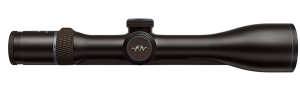
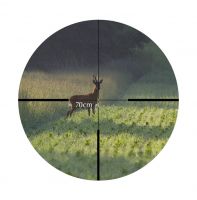
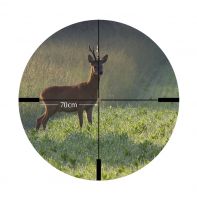
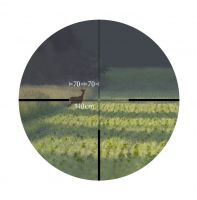
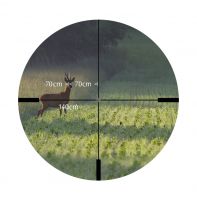
| Manufacturer: | Blaser |
| Price with VAT : | 3 359,89 € |
| Converted with VAT: | 84 518,- CZK |
| Converted without VAT: | 69 850,- CZK |
| VAT: | 21 % |
| Availability: | within 3 days |
BLASER B1 4-20X58 IC
POWERFUL LIGHT RESERVE
58 mm OBJECTIVE LENS DIAMETER
Compared to riflescopes featuring a 56 mm objective lens diameter, 58 mm provide an additional light yield of 7%. This allows use of a higher magnification with better detail recognition in deep twilight or at night.
Blaser B1 4–20x58 iC
The twilight specialist – superior for sitting game and when hunting in the very last light. Excellent light gathering characteristics far exceed what other scopes provide in low light conditions. Making the impossible long range shot possible.
- High contrast and optimal sharpness of detail, especially in the last light
- 58 mm lens diameter means more than 7% additional light yield compared to a 56 mm lens
- 20x magnification provides invaluable services to safely identify game and gives the ability to interpret and understand targets at long range.
Reticle in the first focal plane
For highest possible shooting accuracy under all conditions, technical solutions are needed where precision-reducing factors are already excluded due to the construction. This applies not only to firearm and scope mount, but also to the target optics themselves. A good example of such a coherent design are the notches to fit the Blaser Saddle Mount: They are positioned directly on the barrel, thus resulting in the ideal integration of optics to barrel. The philosophy behind the design of the Blaser riflescopes is “zero tolerance”. Only with riflescopes featuring a reticle in the first focal plane, the point of impact cannot be changed when switching magnification due to their special design. The reticle overlays the target image before the moving parts of the zoom system come into play.
With modern riflescopes the reticle is usually positioned in the second focal plane, close to the eyepiece. This design solution is normally chosen due to cost-efficiency. However, its disadvantage is that mechanical tolerances can cause deviations from the point of impact when changing magnification.
In order to respond to the highest requirements when it comes to precision, the Blaser riflescopes deliberately feature the reticle in the first focal plane – forward of the magnification lenses. Only with this design, mechanical tolerances do not influence the point of impact when changing magnification.
PRECISION IN DETAIL
The reticle revolution
Reticle in the first focal plane, thin reticle structures with minimal target subtension even on highest magnification, daylight-visible illuminated dot, adjustable to extreme light conditions: From daytime in winter to hunting at night. Enabled by Swiss technology.
Bold reticle bars which affect the view at high magnifications were up to now a disadvantage when positioning the reticle in the first focal plane. Thanks to the innovative Swiss phase grating technology, it was possible to realize a low subtension of the reticle with the Blaser riflescopes – even at high magnifications. In combination with the illuminated dot, which can be adjusted due to visibility conditions, a perfect balance is achieved to support accurate shooting under all hunting scenarios.
FAST AND INTUITIVE
Estimating distances easily
When seconds matter; first focal plane scopes are the preferred choice for shooters who will be utilizing reticle subtensions for target distance estimations. This tried and true method eliminates complicated mathematical formulas and allows you to easily estimate range or use the correct hold over point to take a long distance shot. As with reticles in the first focal plane, the distance between the reticle bars in relation to the target size remains constant with any magnification you choose. Your riflescope will become a tool that can be used to estimate the shooting distance at lightning speed.
CONCENTRATE ON THE ESSENTIAL
iC Illumination Control
If the Blaser R8 bolt action rifle features an iC cocking slide, pushing the cocking slide into the ready-to-fire position automatically activates the illuminated dot in all Blaser riflescope models.
A sensor in the riflescope recognizes the position of the cocking slide and automatically regulates the switch-on/-off function of the illuminated dot. In order to prepare for the shot one single movement is enough: Pushing the cocking slide forward. The illuminated dot's intensity then always corresponds to the intensity that was adjusted last. Its adjustment is comfortably done using the turret on the scope's right. Thanks to this perfect interplay of rifle and scope you gain time and thus the necessary calmness for a safe shot.
When using Blaser riflescopes on rifles without iC cocking slide, the illuminated dot is activated manually by pulling out the turret on the right. In order to reach the longest possible battery life, the illuminated dot automatically switches off as soon as the rifle is in a very steep to vertical or lying position. Once taking a shooting position again, the illuminated dot is automatically activated.
IC ILLUMINATION CONTROL
FAST ON TARGET
IVD – Intelligent Variable Dot
The Blaser B1 1–7x28 iC is state-of-the-art level performance additionally equipped with an Intelligent Variable Dot. Rough terrain, foul weather, and high levels of stress will put even the most experienced hunter to the test. The dual output feature of the illuminated dot is just the answer you have been searching for. At low power of magnification, 4x and lower, the illuminated dot is larger in size and ideal for fast moving game providing ideal situational awareness and intuitive target acquisition. The IVD’s dot intensity can also be adjusted by a side mounted turret.
Above 4x magnification the dot size is automatically reduced for accurate shot placement over long distances. Precise dot resolution is essential for target identification and shot placement. The dot intensity can also be adjusted by a side mounted turret. Whether bright sun, reflective snow or deep twilight, as soon as the game comes into sight, target acquisition is intuitive.


REACHING FARTHER
QDC – Quick Distance Control
Shooting over very long distances while hunting is the exception rather than the rule. However, there are situations, in which a long-range shot may become necessary. Good, when you are technically prepared for being able to remain on target and not having to aim higher. The reticle adjustment of the Blaser riflescopes was specially developed for this purpose. Its highly precise and at the same time robust mechanics provide a consistently reliable repeat accuracy.
The riflescope models Blaser B1 2.8–20x50 iC and 4–20x58 iC come with QDC Quick Distance Control as a standard. Before shooting over long distances, the corresponding elevation correction of the fast reticle adjustment can be done quickly and easily even when already in shooting position. A unique feature is the possibility to fix the two adjustments “zeroed” and GEE (4 cm high with a rifle that is zeroed at 100 m). This insures that an unintentional adjustment is not possible. Nevertheless hunters can easily make windage or elevation adjustments with just one twist of the hand, should they need. If, due to a long shooting distance, 4 cm high shot at 100 meters should not be sufficient, the reticle elevation adjustment can be rotated further by the necessary “number of clicks”. In this case, the adjustment is not locked by lowering the adjustment turret, so that its previously selected adjustments remain clearly visible. With this, the risk of forgetting to set back to “normal position”, is almost excluded.
The adjustment turret for parallax is also protected against unintended movement. The turret is locked for a distance of approximately 100 m. The turret is also graduated for distances greater than 100 m and is easily pulled out to select the desired distance.
QDC – QUICK DISTANCE CONTROL
ZEROED AT 100 M OR GEE (MOST FAVORABLE ZEROING RANGE): BOTH ADJUSTMENTS ARE LOCKABLE.



PARALLAX COMPENSATION: NO UNINTENTIONAL ADJUSTMENT POSSIBLE.
The adjustment turret for parallax is also protected against unintended movement. The turret is locked for a distance of approximately 100 m. The turret is also graduated for distances greater than 100 m and is easily pulled out to select the desired distance.



FUNCTION AND DESIGN
Rifle and scope – a perfect match
The Blaser riflescopes were designed by hunters with a passion for hunting. Thanks to the sophisticated layout and intuitive handling of all functional elements, the hunter can totally focus on a safe and accurate shot. Their distinctive design gives rifle and scope a perfectly shaped overall appearance.
TECHNICAL SPECIFICATIONS
Blaser B1 4–20x58 iC
|
Magnification |
4 x – 20 x |
|
Effective lens diameter |
49 mm – 58 mm (1.93 " – 2.28 ") |
|
Exit pupil diameter |
12.3 mm – 2.9 mm (0.48 " – 0.11 ") |
|
Field of view at 100 m (109 yds) |
9.2 m – 1.9 m (10.0 yds – 2.0 yds) |
|
Eye relief |
90 mm (3.5 ") |
|
Transmission |
> 90% night |
|
Parallax compensation |
50 m (54.7 yds) to infinity,100 m (109 yds) arresting |
|
Elevation adjustment at 100 m (109 yds) |
±75 cm (0.82 yds) |
|
Elevation adjustment with QDC at 100 m |
80 cm (31.5 ")* |
|
Windage adjustment at 100 m (109 yds) |
±50 cm (19.68 ") |
|
Adjustment per click |
1 cm / 100 m (0.39 " / 109 yds) |
|
Weight |
770 g (31.22 oz) |
|
Overall length |
365 mm (14.37 ") |
|
Objective bell outside diameter |
64,5 mm (2.5 ") |
|
Eyepiece outside diameter |
45 mm (1,77 ") |
* when using the 0.2° forward inclined Blaser Mount.
Related items - Blaser B1 4–20x58 iC
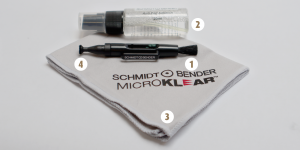
Availability: In stock
| Price with VAT | 42,93 € |
Products in the same category - Blaser B1 4–20x58 iC
New Pulsar Thermion PRO with direct switch on, high capacity batery and lense F 1.0 move you into new night hunt dimmension Superior thermal sensitivity Thermal Imaging Riflescopes THERMION 2 PRO Disclosure The product availability on website is ...
New riflescope for shooting at extreme distances Schmidt & Bender is synonymous with quality and precision. This perception has made Schmidt & Bender one of the leading suppliers of precision scopes in the world. As early as the company's start in ...
New ultimative riflescope for shooting at extreme distances without compromise. The Zero Compromise Optic ZC840 is 440mm (17.32 inches) long, weighs only 1175g (40.5oz) and reaches 28 mil in elevation adjustment and 16 mil in windage adjustment. ...
First riflescope with light transmission more then 96%. Schmidt & Bender is synonymous with quality and precision. This perception has made Schmidt & Bender one of the leading suppliers of precision scopes in the world. As early as the company's ...











